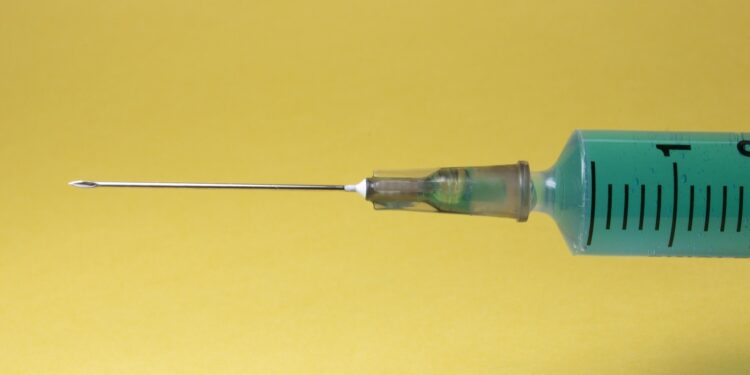Credit: CC0 Public domain
An experimental human papillomavirus (HPV) vaccine appears to be safe and, more importantly, benefit patients who develop a rare airway cancer that manifests as recurrent obstructive growths requiring dozens, sometimes hundreds of procedures surgical procedures throughout life to keep tumors at bay.
The small Phase 1 clinical study of just 15 patients served as proof of concept, demonstrating that recurrent respiratory papillomatosis, a cancerous disorder of the upper respiratory tract, can respond to therapeutic vaccination. The tumors are caused by human papillomavirus type 6 or type 11.
Write in Scientific translational medicine, scientists at the Center for Immune-Oncology, a division of the U.S. National Cancer Institute in Bethesda, Maryland, tackled the problem of relapsing respiratory papillomatosis by testing a vaccine strategy designed to prevent the development of tumors. Dr. Scott M. Norberg, lead author of the research, writes that the evolving approach aims to provide a pathway for prevention of a disease for which there is no cure.
“Recurrent respiratory papillomatosis, RRP, is a rare and debilitating neoplastic disease caused by chronic infection with human papillomavirus type 6 or 11 and characterized by the growth of papillomas in the upper aerodigestive tract,” Norberg writes in the journal . “There are no approved medical treatments and patients require repeated reduction procedures to maintain voice and airway function.”
Norberg added that some people with chronic HPV infection who develop RRP require a staggering number of surgical procedures to maintain near-normal voice and respiratory function. “Patients often require dozens or even hundreds of procedures over their lifetime. Unlike other HPV-associated cancers, the papillomatous lesions of RRP patients lack driver mutations, implying HPV-associated cellular dysfunction. HPV as the primary cause of RRP,” Norberg noted.
While phase 1 trials are generally considered a preliminary step before more rigorous clinical testing, the early testing of this trial is important because the results suggest that therapeutic vaccination can strengthen the immune system’s defenses against RRP. This discovery is considered a beacon of hope for patients and oncologists who have no treatment options other than multiple invasive procedures.
Most people know HPV as the infamous cause of cervical cancer, but chronic infections caused by HPV 6 or HPV 11 can lead to RRP, which is characterized by wart-like growths in the upper respiratory tract. The only recourse for patients is repeated surgical procedures that remove the growths but cannot address the underlying biology that causes them to appear. Doctors are calling for a less invasive method to treat affected patients; Today, scientists may be well on their way to developing an approach to preventing these cancers altogether.
“Therapeutic vaccination may result in the development of antigen-directed T cell responses and clinical activity in virally mediated disorders,” Norberg noted, referring to the hypothesis he and his colleagues maintained early on. of research. He added that “the use of non-human adenoviral vaccine platforms with high genetic loading capacity allows the development of T cell responses to multiple antigen targets.”
In the trial, Norberg and colleagues tested a therapeutic vaccine using a gorilla adenovirus vector. The deactivated adenovirus carried the vaccine payload into the cells of all 15 participants. The team administered different doses of the vaccine – PRGN-2012 – to each participant who had developed severe papillomas over the years that had not responded to previous treatments.
The study found that patients tolerated the vaccine well, experiencing only mild side effects. Half of the group treated with the highest dose had complete responses, defined as not requiring any surgery in the year following treatment. Analyzes suggest that the vaccine works by expanding HPV-specific peripheral T cells.
“To assess clinical response to PRGN-2012, the number of clinically indicated interventions during the 12 months following study treatment was compared to the number of clinically indicated interventions during the 12 months preceding study treatment. study,” Norberg wrote. “Using each patient as their own control for frequency of baseline procedures is necessary due to heterogeneity in disease severity among patients and allows for standardized assessment of clinical activity.”
Therapeutic vaccination with PRGN-2012 resulted in clinical benefit in half of the patients, and the response was linked to a tumor microenvironment that could promote HPV-specific T cell responses, the team found. As this is a phase 1 trial, the data obtained suggest a benefit for patients. Therefore, continued clinical development of PRGN-2012 for patients with RRP is warranted, Norberg and colleagues concluded.
More information:
Scott M. Norberg et al, Tumor microenvironment status is associated with response to therapeutic HPV vaccination in patients with respiratory papillomatosis, Scientific translational medicine (2023). DOI: 10.1126/scitranslmed.adj0740
© 2023 Science X Network
Quote: Experimental vaccine shows promise as preventative for rare HPV-related cancer (December 11, 2023) retrieved December 12, 2023 from
This document is subject to copyright. Apart from fair use for private study or research purposes, no part may be reproduced without written permission. The content is provided for information only.



